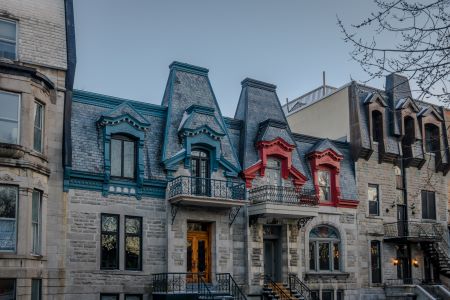Academia and business create zero-carbon buildings accelerator to help Montreal meet climate targets

Academia and the private sector have created a zero-carbon buildings accelerator with a “SWAT team” to help achieve net-zero emissions for Montreal’s buildings by 2040.
While many Canadian cities have set climate goals, the accelerator in Montreal is a first-of-its-kind collaboration. Anchored by Concordia University, the initiative includes real estate developers, the City of Montreal, the National Bank of Canada, Hydro Quebec and other key community stakeholders.
The idea for the accelerator began with Dr. Ursula Eicker, PhD, a professor of building, civil and environmental engineering at Concordia University, and Natalie Voland, president of real estate development firm Quo Vadis.
As members of the Montreal Climate Partnership, which aims to accelerate Montreal’s goal to reduce its GHG emissions by 55 percent by 2030, Eicker and Voland wanted to go beyond declaring climate goals and take action to speed up more sustainable buildings construction with lower carbon emissions.
“We thought we’d make a kind of SWAT team to put all the people together to support the private sector building projects, to remove one barrier after the other,” said Eicker, Canada Excellence Research Chair in Smart, Sustainable and Resilient Cities and Communities, and founding co-director of the Next-Generation Cities Institute at Concordia University.
Voland, a PhD student with Eicker, told Research Money she realized that if the drive to net-zero emissions made it too difficult for developers to build in Montreal, they would take their capital and build elsewhere.
“What we really wanted to do with the accelerator program is to give the tools and resources to the developers to stay in Montreal, to build and build better,” Voland said.
Eicker, as part of her Canada Research Chair, brought together more than 100 faculty members at Concordia who do research on cities and created the multi-disciplinary Next-Generation Cities Institute, so they could all collaborate on sustainable urban development. That collaboration is benefitting the net-zero carbon buildings accelerator, where Concordia University objectively evaluates projects brought forward by developers.
As part of that evaluation, Concordia faculty members work with developers to define sustainable building project indicators and assess individual projects, from energy systems to building envelope standards.
“The university is a more neutral, science-based partner to make sure that the indicators we come up with have some solid foundations,” Eicker explained.
The accelerator also provides a platform for Concordia’s research, enabling student innovators to connect with developers and work on real-world projects.
Voland said having Concordia as a partner is a win-win for developers, who have access to academic expertise, research data and tools to validate their project proposals.
“You cannot have one without the other. Put academia together with business and you make stuff happen,” she said.
Retrofitting Montreal’s heritage buildings
Voland said the accelerator’s partners, which include influential decision-makers, provide opportunities to strengthen developers’ business plans and make retrofits or new construction cheaper.
For example, various partners might be able to offer fast-track zoning changes, technical data, expert legal advice, and attractive financing, including long-term loans at low interest.
Voland added Concordia’s academic input “is also making sure that we don’t have 75 engineers that are giving developers 25 different solutions,” which helps streamline the process and saves developers money.
Although new building projects also are considered, Eicker said the focus is on retrofitting Montreal’s existing stock of buildings, since the city has too little new construction to make a big difference in achieving Montreal’s net-zero target. Such an emphasis also presents another challenge: how to retrofit Montreal’s distinct historical buildings while still retaining their heritage character and attributes?
Such buildings often lack original building plans, Voland said, making it difficult to determine what may be behind the walls in terms of insulation, wiring, plumbing, or other aspect of the structural envelope. Electricity from renewable sources, for example, may not be available for buildings without a suitable electricity-distribution system.
“It’s doable, it's just more complicated," she acknowledged. " And it’s hard to replicate it quickly, because each [heritage] building is different."
Nor is electricity essential to getting to net zero, Eicker added, since Hydro Quebec’s electrical grid does not have the capacity to make all services in all buildings 100-percent electric.
“For the buildings and the transportation sectors, if everything is electric and we all connect to the same distribution network, then we need to really seriously talk about more energy efficiency in buildings, because otherwise the capacity is just not there,” she said.
Voland said if she were to take just one of her buildings, which is 450,000 square feet, and completely electrify its energy systems, the structure would consume four times the amount of power it currently uses. “So it’s not only the type of energy [that needs to be considered], it’s reduction of energy.”
On top of that, a greater reliance on electricity reduces a building's resilience, such as an ability to cope with power grid failures. About two-thirds of the energy used in Montreal’s buildings comes from fossil fuels such as natural gas and some buildings still rely on oil furnaces. These fossil fuel sources will need to be phased out if Montreal is going to meet its net-zero target, Eicker said.
“But it doesn’t make sense to rip out all the gas heaters tomorrow,” she added. “There needs to be a transition plan. It’s really important to be very clear when these phase-outs happen.”
Transitioning to net-zero buildings is a daunting challenge
Natural Resources Canada this month concluded a call for proposals for its Codes Acceleration Fund, which will support governments and stakeholders across the country in adopting and enforcing new building and energy codes.
The call is part of the federal government’s Green Buildings Strategy, to increase the rate of retrofits, ensure buildings are resilient and net-zero ready, and decarbonize space and water heating. Federal Budget 2022 committed $150 million over five years to develop the strategy.
The federal Emissions Reduction Plan aims to cut building emissions in 2030 by 42 percent, compared with 2019 levels.
But Canada would need to retrofit more than 400,000 homes per year to fully electrify all dwellings by 2050, according to a study last year by the C.D. Howe Institute.
Meeting Canada’s 2050 emissions-reduction target for residential homes alone could cost between $4.5 billion and $6 billion per year, the study found. But several studies show the costs of not taking action on climate change will be much higher in the long run, compared with making investments now.
“It needs to be the public sector who sets the rules and manages these sorts of long-term risks,” Eicker explained.
Other cities also are taking action. Vancouver, for example, last year became the first Canadian city to require all large commercial buildings to use only renewable energy by 2040, as well as setting limits on carbon emissions for existing buildings.
Also, the Federation of Canadian Municipalities received $183 million in federal funding to create the Low Carbon Cities Canada (LC3) network, which in 2022 established seven local LC3 centres in Canada’s largest urban areas.
This week, the Canada Infrastructure Bank, as part of its Building Retrofit Initiative, announced up to $100 million to support cleantech integrator and project developer Ameresco Canada Inc. in decarbonizing commercial and industrial buildings across Canada.
Eicker and Voland hope Montreal’s net-zero carbon buildings accelerator will serve as a foundation for building a network of similar academia-business partnerships in other Canadian cities.
Voland said all the “pods” in the network then would be able to share their learnings and best practices in sustainable building projects.
According to Voland, sustainable, net-zero buildings across Canada are the way of the future. “We don’t have a choice anymore, because tenants want it, buyers want it, families want it, employees want it and government wants it.”
R$
Events For Leaders in
Science, Tech, Innovation, and Policy
Discuss and learn from those in the know at our virtual and in-person events.
See Upcoming Events
You have 0 free articles remaining.
Don't miss out - start your free trial today.
Start your FREE trial Already a member? Log in
By using this website, you agree to our use of cookies. We use cookies to provide you with a great experience and to help our website run effectively in accordance with our Privacy Policy and Terms of Service.





